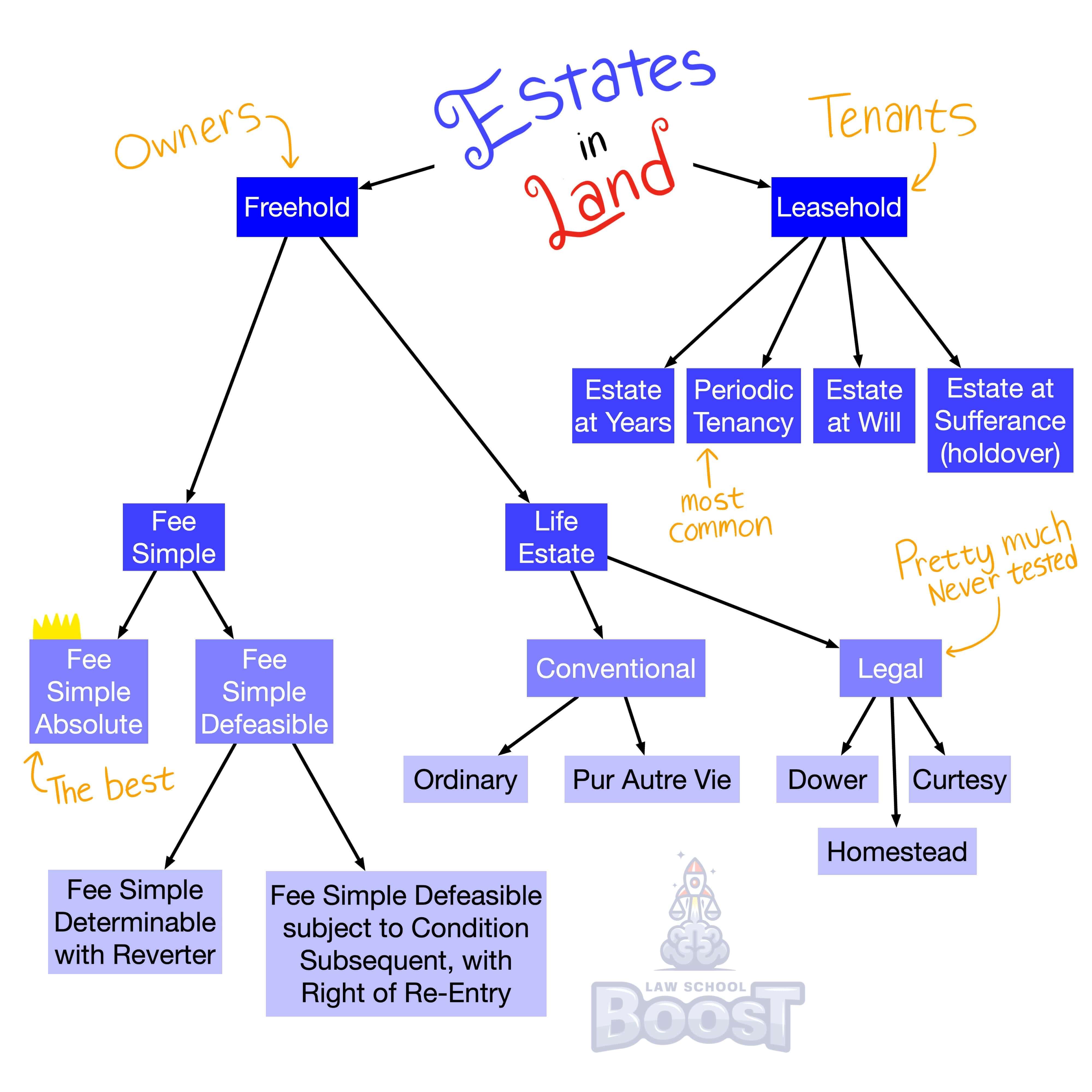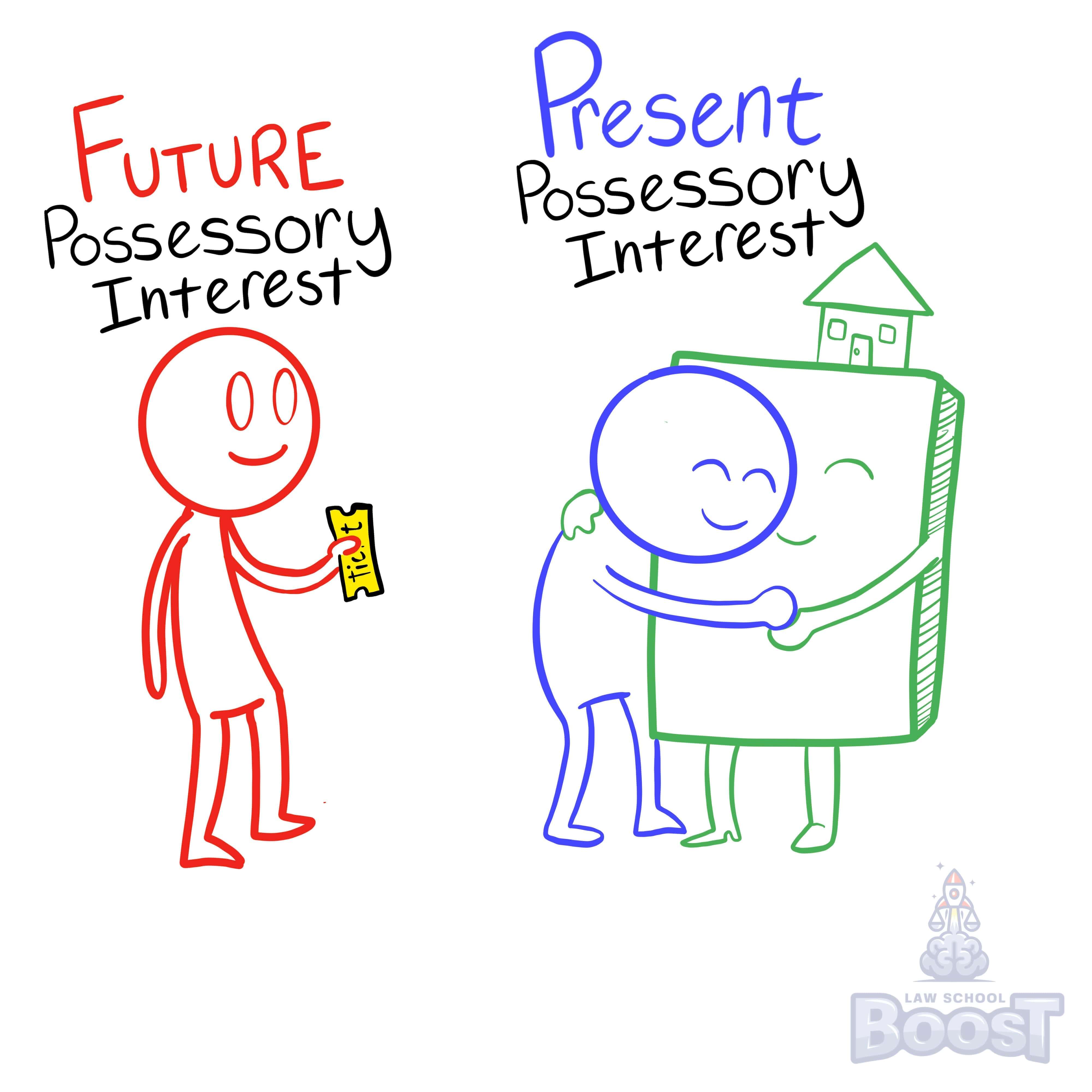😀
Real Property • Future Interests
PROP#029
Legal Definition
A shifting executory interest is a future interest in a third party that divests a transferee's preceding estate.
Plain English Explanation
An executory interest will always cut off a previous estate. Whether an executory interest is springing or shifting is determined by what previous estate was cut off.
If the previous estate that is being cut off is held by the grantor, then it is a springing executory interest.
If the previous estate that is being cut off is held by by a third party (so anyone other than the grantor), then it is a shifting executory interest.
If the previous estate that is being cut off is held by the grantor, then it is a springing executory interest.
If the previous estate that is being cut off is held by by a third party (so anyone other than the grantor), then it is a shifting executory interest.
Hypothetical
Hypo 1: Oz conveys Blackacre "to Amy when, and if, she attends law school." Amy is 15 years old. Result: Oz, the grantor, has a fee simple subject to an executory interest. If later in life, Amy attends law school, she will cut short Oz's estate in Blackacre. Thus, Amy has a springing executory interest.
Hypo 2: Oz, the grantor, conveys Blackacre "to Amy for life, and 2 years after Amy's death to Bob." Result: Amy has a life estate. Oz has a reversion. The law requires someone to always own a piece of land, so here we see that after Amy dies there is a gap in possession for 2 years. During that 2 years, the land will revert back to Oz. After 2 years pass, then Bob is allowed to take the estate from Oz, the grantor. Thus, Bob has a springing executory interest that divests the grantor (Oz). It may appear as if Bob has a remainder, but a remainder only exists if it naturally follows a previous estate. Here, that isn't the case. After Amy dies, Bob must wait 2 years before taking the estate (rather than automatically).
Hypo 3: Oz conveys Blackacre "to Amy and her heirs, but if Bob becomes an attorney, then to Bob and his heirs." Result: Oz has given Amy a fee simple subject to an executory interest. If Bob never becomes an attorney, Amy keeps Blackacre and can pass it on to her heirs when she dies. However, if Bob becomes an attorney, title in Blackacre shifts from Amy to Bob. Note that Bob cuts short Amy's interest, not Oz (the grantor). Thus, Bob has a shifting executory interest.
Hypo 2: Oz, the grantor, conveys Blackacre "to Amy for life, and 2 years after Amy's death to Bob." Result: Amy has a life estate. Oz has a reversion. The law requires someone to always own a piece of land, so here we see that after Amy dies there is a gap in possession for 2 years. During that 2 years, the land will revert back to Oz. After 2 years pass, then Bob is allowed to take the estate from Oz, the grantor. Thus, Bob has a springing executory interest that divests the grantor (Oz). It may appear as if Bob has a remainder, but a remainder only exists if it naturally follows a previous estate. Here, that isn't the case. After Amy dies, Bob must wait 2 years before taking the estate (rather than automatically).
Hypo 3: Oz conveys Blackacre "to Amy and her heirs, but if Bob becomes an attorney, then to Bob and his heirs." Result: Oz has given Amy a fee simple subject to an executory interest. If Bob never becomes an attorney, Amy keeps Blackacre and can pass it on to her heirs when she dies. However, if Bob becomes an attorney, title in Blackacre shifts from Amy to Bob. Note that Bob cuts short Amy's interest, not Oz (the grantor). Thus, Bob has a shifting executory interest.
Visual Aids


Related Concepts
At common law, how was a contingent remainder destroyed?
In assessing a contingent remainder what is the doctrine of merger?
What are future interests?
What is a class gift?
What is a contingent remainder?
What is an executory interest?
What is an indefeasibly vested remainder?
What is a remainder?
What is a springing executory interest?
What is a vested remainder subject to open?
What is a vested remainder subject to total divestment?
What is the Doctrine of Worthier Title?
What is the Rule in Shelley's Case?
What is the Rule of Convenience?


